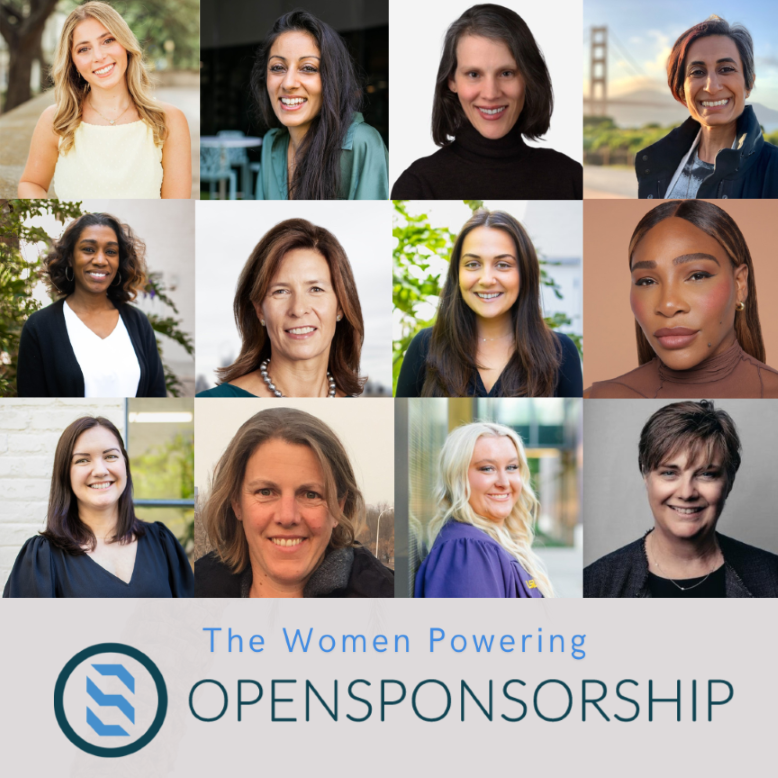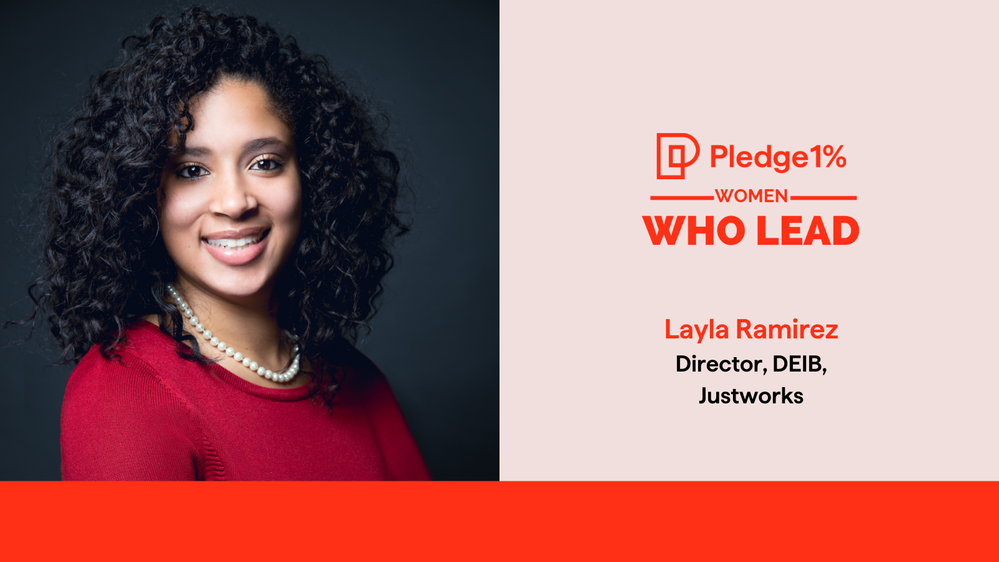
Layla Ramirez
Director, DEIB, Justworks
New York, NY
Pledge 1% is celebrating its 10th Anniversary this year. What can companies do (or do more of) to have a positive social impact in the next 10 years?
Companies can maximize their social impact over the next decade by integrating purpose into their core business strategy. Leading with values means embedding social responsibility into decision-making, from product development to supply chains. Rather than one-time contributions, businesses should focus on sustained, long-term impact—leveraging their unique expertise, resources, and networks. Committing a percentage of one’s equity, time, profit, or product through initiatives like Pledge 1% is a great way to ensure impact grows alongside business success.
What’s the legacy you hope to leave for future generations?
I hope to leave a legacy of a world where opportunity and talent are equally distributed—where everyone, regardless of background, has the resources and support to realize their full potential. True progress happens when barriers are removed and people are empowered to contribute their skills, ideas, and passions to society.
This means fostering access to education, mentorship, and economic opportunity, ensuring that those who choose to pursue their dreams have the means to do so. It’s about creating systems that uplift rather than exclude, where success isn’t determined by circumstance but by determination and ability.
If future generations inherit a world where talent is recognized and nurtured everywhere, not just in privileged spaces, we will have built a more thriving society.
If you could choose one word to define your leadership style, what would it be and why?
Inclusive. Because true leadership is about creating an environment where every voice is heard, valued, and empowered. Having experienced the power of inclusive leadership firsthand, I am convinced that it is the key to navigating change, unlocking potential, and driving sustained success.
An inclusive approach fosters diverse perspectives, fuels innovation, and strengthens teams by ensuring that everyone feels a sense of belonging and purpose. It’s not just about giving people a seat at the table—it’s about making sure they have a voice in shaping the future.
By prioritizing inclusivity, leaders cultivate trust, resilience, and a shared commitment to excellence. In a rapidly evolving world, the ability to bring out the best in people—regardless of background or experience—is what sets great leaders apart.
If you could give one piece of advice to the next generation of women leaders, what would it be?
Trust yourself and do the things your future self will thank you for. Every decision is an opportunity to shape the leader you aspire to become—lean into it with confidence. Growth comes from stepping outside your comfort zone, embracing challenges, and owning your voice. The path won’t always be easy, but by investing in yourself and your vision, you’ll create a future where you thrive and inspire others to do the same.
Trust yourself and do the things your future self will thank you for.
Looking ahead, what are you most excited about—whether in your professional journey or personal life?
I’m most excited about continuing to do meaningful, values-aligned work at a company that truly walks the talk. It’s incredibly fulfilling to be part of an organization that prioritizes impact, and I look forward to deepening that commitment through collaboration—both internally and externally—to drive real progress in inclusion and social impact.
On a personal level, I’m thrilled to support my husband as he embarks on his journey of acquiring a small business. Seeing his vision come to life and helping him and his team leverage Justworks to build a strong foundation is something I genuinely look forward to.
This season is full of opportunities to create, contribute, and uplift others, and I’m energized by the potential to make a lasting difference in both my professional and personal life.
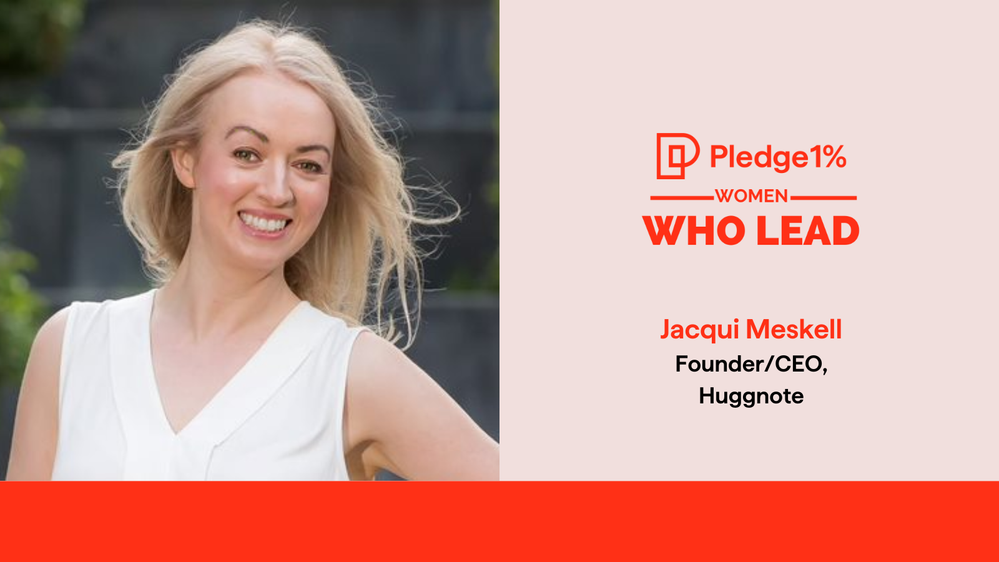
Jacqui Meskell
Founder/CEO, Huggnote
Limerick, Ireland
Pledge 1% is celebrating its 10th Anniversary this year. What can companies do (or do more of) to have a positive social impact in the next 10 years?
For me, there’s no question, and it’s the exact opposite of what some leaders have been pushing for lately. The best way to create a positive impact on both society and the economy is to have more women in leadership, running companies and, indeed, countries. With business and politics becoming increasingly intertwined, the stakes have never been higher.
Women’s voices need to be heard. It’s critical we have a seat at the table, not as a token gesture, but because women-led companies are more likely to tackle pressing societal issues. Female-led teams take better care of their employees and communities, creating lasting benefits that extend for generations. And, for those in the back – the data is undeniable: women-led companies consistently outperform those led by men.
That’s no coincidence. When profits and purpose align, everybody wins.
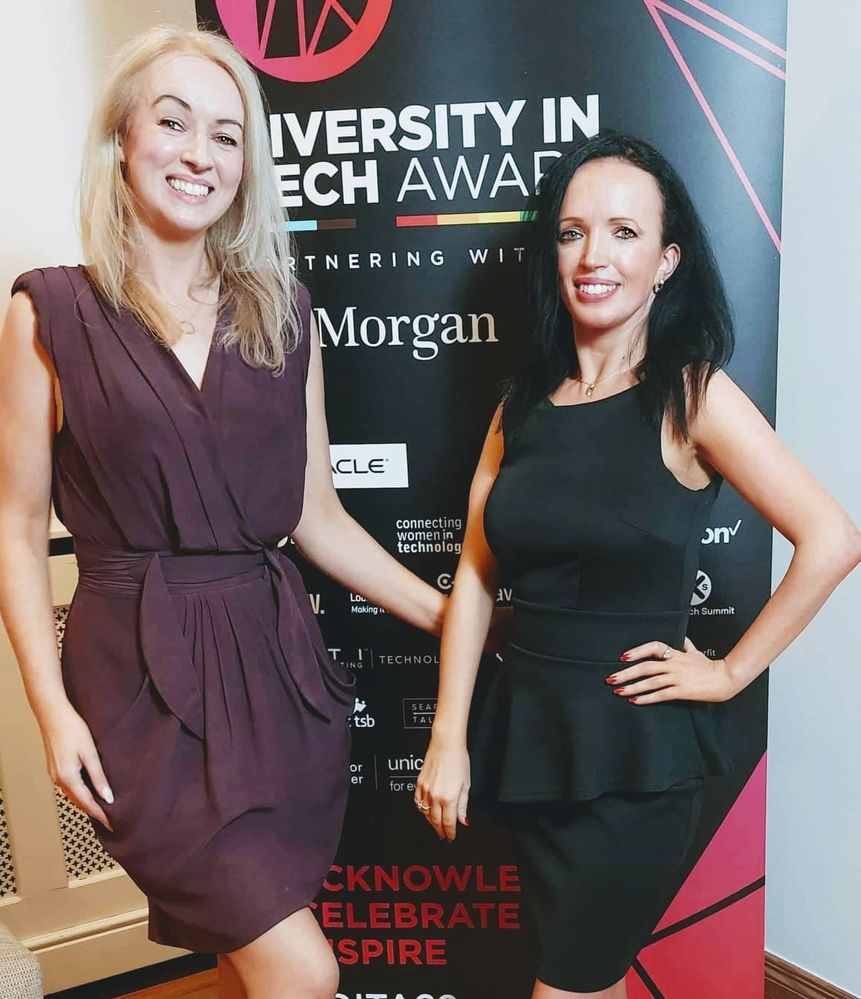
What’s the legacy you hope to leave for future generations?
Huggnote is on a mission to make two billion hearts sing, because we believe that’s exactly what the world needs now and well into the future. Technologies may evolve, but our core mission remains the same: to be a catalyst for fostering genuine, heartfelt connection. To make it easy to be there for others in the instant it’s needed. And yes, our ambition is bold. But that’s the point. We want to inspire others to dream big, chase their passions fearlessly, and know that with courage, failure isn’t an option.
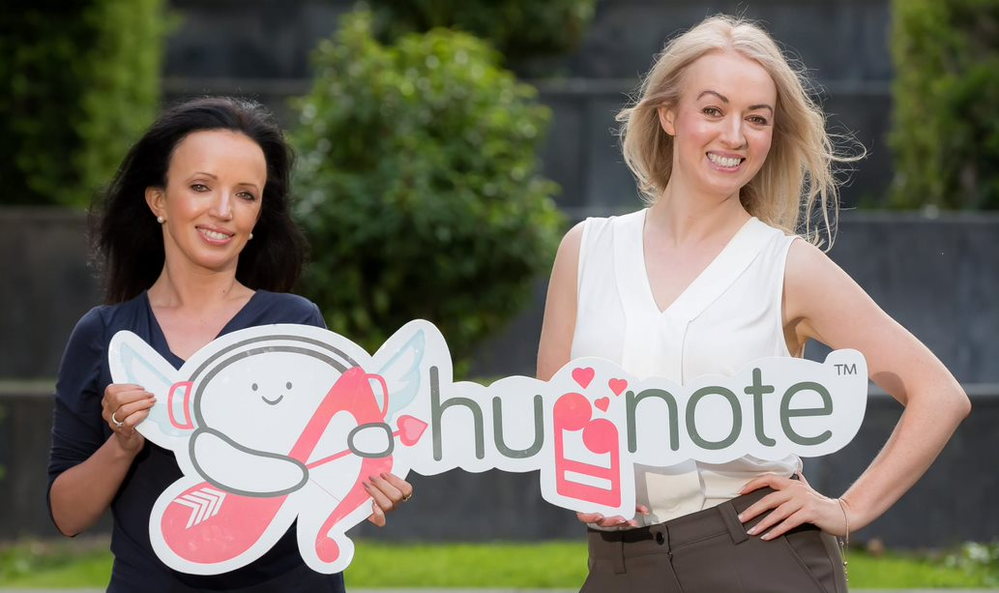
If you could choose one word to define your leadership style, what would it be and why?
Empathic.
As a leader, I’m crystal clear on my mission and the strategy to achieve it. I set high standards for myself and others because I believe we’re all capable of far more than we realise. But potential can only be fully unlocked when it’s nurtured the right way.
Every team member has unique circumstances, strengths, and needs. To lead effectively, I believe it’s my responsibility to understand these and create the right conditions that will enable each person to thrive, because when people are at their best, they perform at their best.
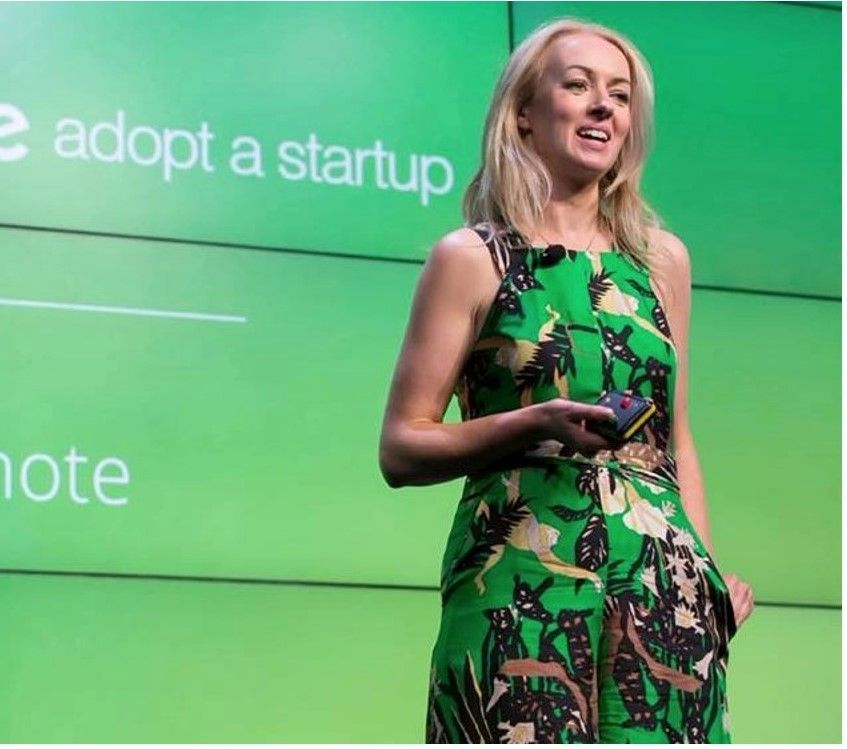
If you could give one piece of advice to the next generation of women leaders, what would it be?
Don’t be afraid of your femininity, it’s a strength. Lean into it.
Unlearn everything that dulls your intuition and question everything. We don’t have to do things the way they’ve always been done. In fact, it’s imperative that we don’t. We won’t find our way forward by following the same path that led us here.
Unlearn everything that dulls your intuition and question everything.
Remember that every societal, political, and economic construct thus far was designed through an androcentric lens. We cannot build a new future with the same old bricks.
Looking ahead, what are you most excited about—whether in your professional journey or personal life?
So much! 2025 is already shaping up to be a whirlwind year, and we’re ready for it. We have ambitious goals for Huggnote’s growth, plus a big geographic move on the horizon, very exciting! The best part? Getting to do it all with my sister and co-founder Perry.
Entrepreneurship, like life, is all about the journey – we can be sure there will be lots of ups and downs but I couldn’t ask for a better co-pilot.

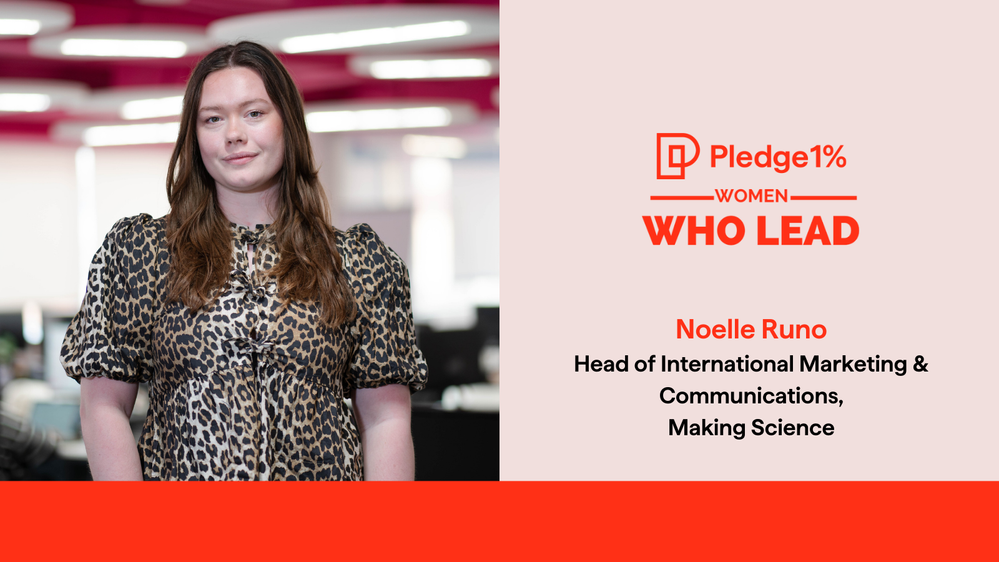
Noelle Runo
Head of International Marketing & Communications, Making Science
London, UK
Pledge 1% is celebrating its 10th Anniversary this year. What can companies do (or do more of) to have a positive social impact in the next 10 years?
Integrating an ESG strategy that empowers employee participation in volunteering, contributing to local and global causes, and fostering collaboration with non-profits and other businesses for greater reach and impact.
What’s the legacy you hope to leave for future generations?
I hope to leave a legacy that enable young professionals to pursue impactful opportunities beyond their comfort zones.
If you could choose one word to define your leadership style, what would it be and why?
Empowering – I encourage my team to lead, teach and research, to feel ownership and involvement in all countries and teams to produce the best materials and campaigns for their local and global brand.
If you could give one piece of advice to the next generation of women leaders, what would it be?
To embrace femininity, and don’t try and fit into the stereotypical corporate world and trust your gut.
Looking ahead, what are you most excited about—whether in your professional journey or personal life?
I am excited to keep growing in my career with a company who are always evolving and pushing boundaries in digital marketing and AI. On a personal level, I’m excited for the year ahead, with a lot of great travel plans and events with my partner, friends, and family.
To embrace femininity, and don’t try and fit into the stereotypical corporate world and trust your gut.
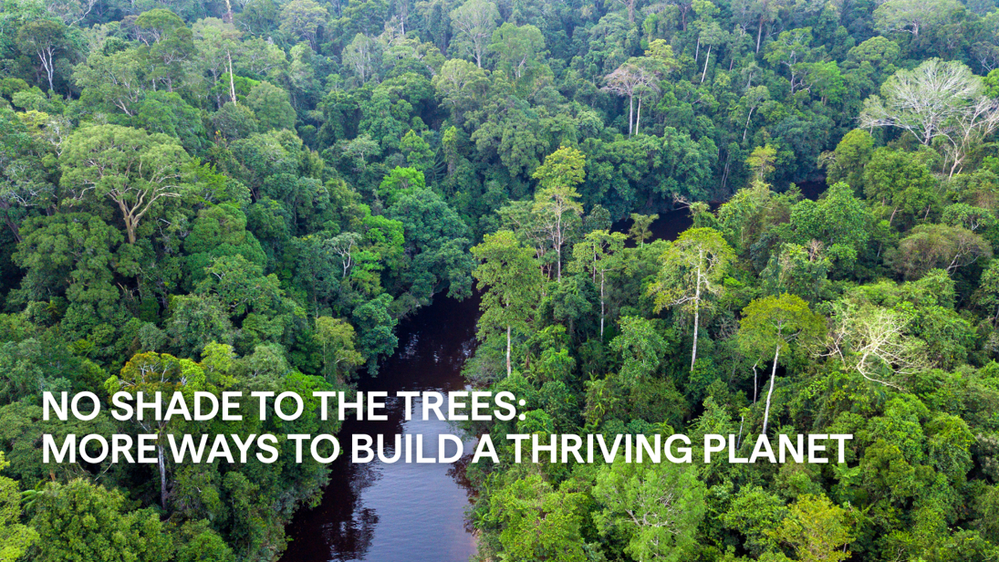
Author = Pledge 1% Team
Every Earth Month, tree-planting initiatives take center stage—and for good reason. Trees clean our air, cool our cities, and absorb carbon, making them a powerful tool in creating a healthier environment for all. YES! AND at this moment, it also makes sense to expand the conversation to include other impactful environmental actions. By looking beyond trees, we can work to ensure that sustainability efforts are more inclusive, community-driven, and effective.
Yes Trees! AND . . .
Tree planting is a fantastic climate solution when done thoughtfully—in the right places, with the right species, and with long-term care in mind. However, in some cases, tree-planting campaigns can overlook the broader environmental and social needs of a community.
For example:
-
- Urban neighborhoods suffering from extreme heat need not just trees, but also cooling infrastructure like reflective rooftops and accessible green spaces.
- Some ecosystems, like grasslands and wetlands, store more carbon than forests yet receive far less attention.
- Indigenous land stewardship, which has preserved ecosystems for generations, is often overlooked in favor of new planting initiatives.
By broadening our approach, we can amplify the impact of tree planting and create holistic climate solutions that work for everyone.
Consider trying one of these alternative focus areas during Earth Month this year:
Support Community-Led Urban Greening
Instead of planting trees and walking away, we can support local initiatives that engage communities in planting, maintaining, and benefiting from urban forests. Programs that prioritize cooling shade, biodiversity, and long-term care ensure that trees thrive for generations.
For example, Docusign.org has funded the creation of pocket forests through their Local Impact Fund, which provides grants to organizations enhancing urban sustainability in the cities where they have their largest offices. To date they have provided grants that supported new forests in Seattle and Dublin. Docusign employees join forces with the local Forest Maker and community members to both plant and maintain the forest through volunteer events.
In Seattle, Docusign.org worked with SUGi, a nonprofit that provides a 360 degree approach to biodiversity building, ecosystem restoration, and (re)establishing Nature connections in communities. Check out the Seattle Unity Forest as a great example of this partnership.
Protect and Restore Wetlands, Grasslands, and Mangroves
Forests aren’t the only ecosystems that capture carbon. Wetlands and grasslands store carbon even more efficiently while also preventing erosion and protecting wildlife. Supporting conservation efforts for these ecosystems is a powerful climate action.
Consider Salesforce, who in 2021 supported the establishment of the Mangrove Breakthrough Secretariat and invested in eight mangrove restoration and conservation projects to support the Mangrove Breakthrough, including Blue Ventures, World Wildlife Fund (WWF), Osa Conservation, One Tree Planted, Fundación Mexicana para el Océano A.C., Perry Institute of Marine Science, Conservation International, and the Sustainable Ocean Alliance Tanzania.
Honor Indigenous Land Stewardship
Many Indigenous communities have been protecting and restoring ecosystems for centuries. Supporting Indigenous-led conservation projects, land rematriation, and traditional ecological practices ensures that climate solutions are guided by deep-rooted wisdom and sustainable management.
Zoom Cares, for example, focuses on supporting indigenous-led and community-based initiatives that work to build thriving communities. They funded the Arctic Eider Society, a Canadian nonprofit that collaborates with Inuit and Cree communities to address the environmental changes impacting sea-ice ecosystems in the Hudson and James Bays. This funding supported the development and management of the SIKU App, a mobile app and web platform designed by and for Inuit communities to facilitate indigenous-led research and environmental monitoring.
Support Community Composting
Organic waste in landfills produces methane, a potent greenhouse gas. Starting a neighborhood composting program diverts waste while creating nutrient-rich soil for local gardens. It’s a circular solution that builds community connections.
The California Alliance for Community Composting (CACC) is a network of composting advocates, organizations, and community members dedicated to expanding decentralized, community-based composting across California. They focus on supporting small-scale composting sites, promoting compost education, and influencing policy to make composting more accessible. CACC works to reduce food waste, enrich soil health, and strengthen local food systems by empowering grassroots composting initiatives.
Address Resilient Housing and Urban Heat
Trees help reduce urban heat, but so do cool roofs, reflective pavement, and energy-efficient buildings. Supporting projects that address housing and infrastructure improvements can make cities more livable and resilient.
C40 Cities is a network of nearly 100 major cities working together to address climate change. The organization helps cities implement policies and share best practices to reduce emissions, improve air quality, and build climate resilience. Their initiatives focus on areas such as clean energy, sustainable transportation, waste reduction, and urban cooling strategies like green infrastructure and reflective surfaces.
Embrace Upcycling and Waste Reduction
Reducing waste is just as important as planting trees. Upcycling—repurposing old materials into new, useful items—helps cut down on landfill waste and reduces the need for new resource extraction. Supporting circular economy initiatives, sustainable fashion, and creative reuse programs can make a big impact.
For example, Pledge 1% member Liquidonate is a social enterprise that uses proprietary software to match goods from retailers, brands, and other sources with nonprofits, charities, and schools in need.
And Toast, the all-in-one payment platform built for restaurants, has partnered with Food Rescue US, both with an integration in their POS platform so their restaurant customers can indicate they have food to be rescued and donated as well as through a campaign encouraging Toast employees to use the app to rescue food in their community and deliver it to local nonprofits to prevent food waste.
Stick with the Trees Too
This isn’t about abandoning tree planting—it’s about expanding our environmental toolkit. Many regions absolutely benefit from increased tree cover, particularly urban heat islands and deforested areas. The key is thoughtful implementation of the right solution for each ecosystem.
For those who want to support tree planting efforts, consider organizations like One Tree Planted. Many of our Pledge 1% members have worked with One Tree Planted and designed creative campaigns to get their stakeholder communities involved in planting trees. Motivate your community to interact with your social content by planting trees for “likes” or integrate tree planting into your conferences and events. Supporting trees is something everyone can get behind.
Finally, if you want to offer your employees the freedom to choose how they want to get involved and maybe leverage some friendly team competition, you might consider something like the Earth Month EcoChallenge. Running from April 1-30, it invites participants to take part in daily actions promoting environmental and social change. By selecting actions aligned with their values, participants work towards a more sustainable and equitable future. Driven by passionate employees, Atlassian is supporting its employees in logging actions globally throughout the month of April.
This Earth Month, consider which environmental action best suits your local ecology and your stakeholders. Perhaps it’s joining a seagrass restoration effort if you live near the coast, or advocating for green roof installations in your urban neighborhood. By diversifying our approach to environmental stewardship, we create a more resilient, holistic movement—one that recognizes the unique value of all ecosystems.

Christine Shaw
VP of Engineering, Six Feet Up
Louisville, KY, USA
Pledge 1% is celebrating its 10th Anniversary this year. What can companies do (or do more of) to have a positive social impact in the next 10 years?
Early in my career, during the .com boom, I often felt like just another cog in the machine — writing code without a clear sense of purpose. I wanted more. That changed when I took on a project for a hospice organization. My code wasn’t just about improving efficiency; it helped caregivers provide better support to patients and their families. That moment reshaped my perspective: even if I’m not on the front lines, I can build the tools that empower those who are.
At Six Feet Up, we carry that mindset forward. We partner with organizations tackling climate change, advancing healthcare, and making data more accessible — helping them scale their impact through technology. The real power of innovation isn’t in the lines of code we write, but in how those solutions are used to create positive change.
Companies have an opportunity to do more. Beyond donating time, talent, or profits, we need to take a step back and ask: Are we building responsibly? Are we creating technology that uplifts, rather than exploits? Are we empowering those solving the world’s biggest challenges?
If more companies took that approach — thoughtfully designing for impact — we wouldn’t just be advancing technology. We’d be shaping a future where innovation serves a greater good.
What’s the legacy you hope to leave for future generations?
I want to be remembered as someone who made it easier for others to do the work they were meant to do. Whether through the systems I’ve built or the teams I’ve led, my goal has always been to remove blockers, create better processes, and give people the freedom to excel in their expertise. If I’ve done that well, then I’ve made a lasting impact.
For me, leadership isn’t about having all the answers — it’s about fostering an environment where others feel trusted, empowered, and supported enough to find the answers themselves. If my team looks back and remembers me as someone who had their backs, cleared the path, and helped them grow, then I know I’ve left the right kind of legacy.
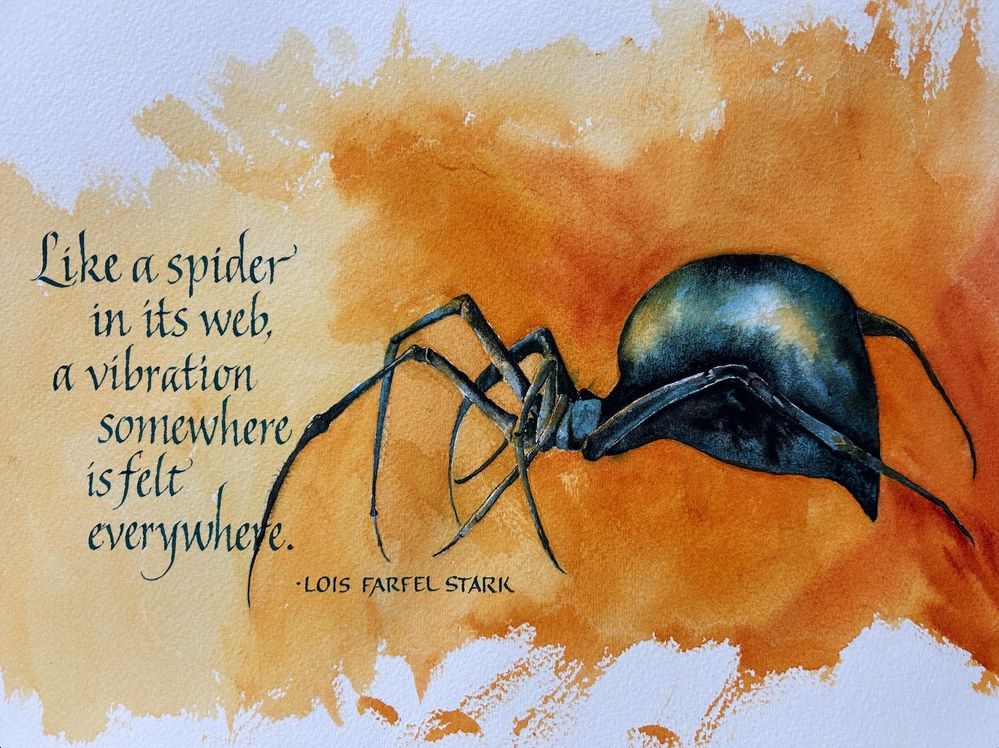
If you could choose one word to define your leadership style, what would it be and why?
Trusting. Trust is the foundation of how I lead. I believe in my team — not just in their skills, but in their ability to take ownership, solve problems, and deliver great work. I don’t micromanage because I don’t have to; I give them the space to thrive, knowing they’ll rise to the challenge. And when they do need me? I’m right there beside them, clearing roadblocks and making sure they have what they need to succeed.
Great teams aren’t built on control — they’re built on confidence, autonomy, and support. That’s the kind of culture I work to foster every day.
Great teams aren’t built on control — they’re built on confidence, autonomy, and support.
That’s the kind of culture I work to foster every day.
If you could give one piece of advice to the next generation of women leaders, what would it be?
Believe in yourself — even when the world tells you not to. I spent years struggling with self-doubt. I went to an engineering school where they made it painfully clear that women weren’t exactly welcome. But I found my place, and you will too. Don’t let anyone make you feel like you don’t belong. You do.
Tech has changed a lot since then, but the challenges haven’t disappeared. There are still moments when you’ll feel like you don’t belong. Ignore them. Keep going. Find the people who do believe in you, and surround yourself with them. You don’t have to be the loudest person in the room to be a leader. You just have to keep showing up.
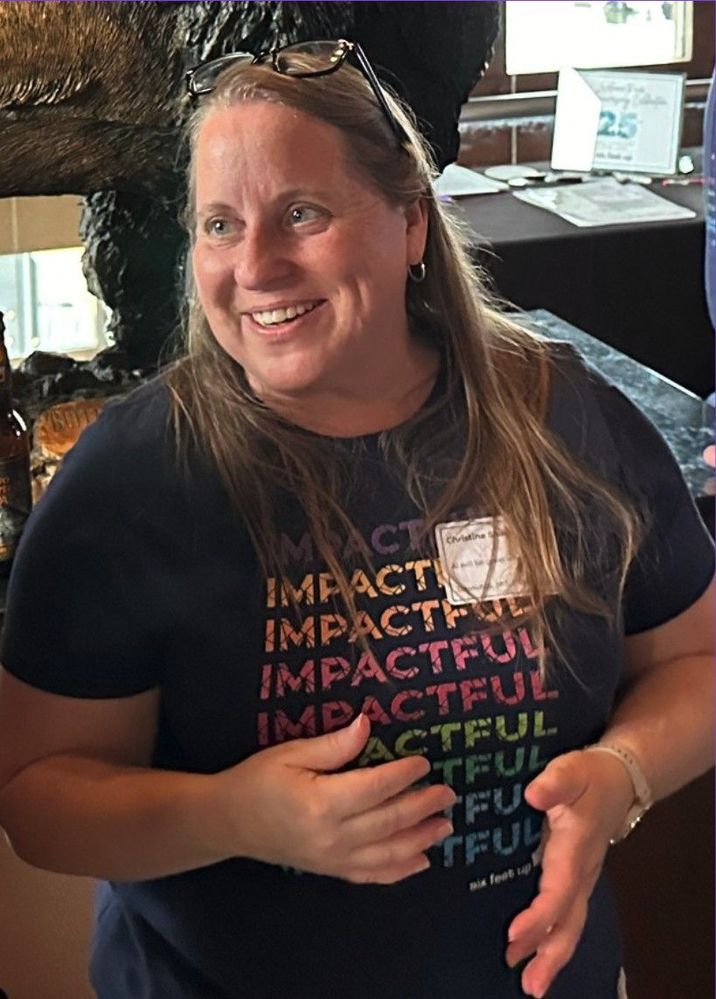
Looking ahead, what are you most excited about—whether in your professional journey or personal life?
Professionally, I’m excited about growth — both mine and my team’s. At Six Feet Up, we’ve built a solid foundation with strong systems and a great team culture. We’re ready to scale, whether that means doubling, tripling, or tackling new, complex challenges. Knowing we have the right people and processes in place to grow without losing what makes us great — that’s an exciting place to be.
Personally, I’m looking forward to creating more art. My studio is my retreat, a space where there are no deadlines, no pressure — just the freedom to experiment. I combine watercolor and calligraphy, often drawing inspiration from nature. Whether anyone ever sees my work or not doesn’t matter. It’s something I do for me.
At the end of the day, it’s about balance — investing in my team, building meaningful solutions, and making space for creativity and joy.

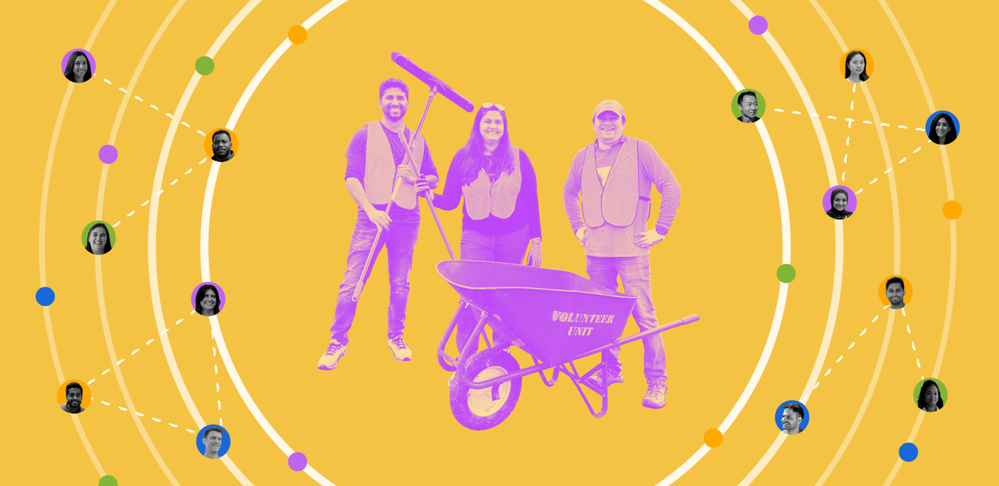
Original article here.
Authors: Dr. Mahreen Khan and Dr. Khue Tran
There’s something powerful about giving back. Whether it’s helping a colleague, mentoring someone new, or dedicating time to a cause you care about, acts of service don’t just benefit others – they benefit those doing the giving, too.
At Atlassian, this philosophy is part of our ethos. Atlassian supports a culture of giving back by providing employees with 40 hours of paid leave to volunteer every year; encouraging team volunteering at our in-person team events; and embedding volunteer work into many teams’ Objectives and Key Results (OKRs). The visibility of these efforts, whether highlighted in company Town Halls or public tracking of team volunteering hours, reinforces how deeply this is woven into the fabric of the company.
And these initiatives work. Since June 2024, 3,252 Atlassians have volunteered through the Atlassian Foundation, contributing an incredible 26,891 hours total. That’s an average of 8 hours of volunteering per person!
And while these numbers are impressive, the real story lies in how volunteering is improving engagement, satisfaction, and even team performance. So, what does the research say about giving back?
Why volunteering makes us happier (and better) at work
It improves job satisfaction and loyalty
We conducted research internally at Atlassian by connecting survey data with volunteering data. Our research demonstrates that Atlassians who volunteer are less likely to want to seek jobs elsewhere and are more likely to believe Atlassian is a great place to work. When employees feel they are a part of something bigger, they develop a stronger connection to their workplace.
Our findings align with other research on corporate social responsibility (CSR) – companies that invest in social impact don’t just do good for the world; they also foster happier, more engaged employees.
It strengthens team connections
Volunteering isn’t just about individual growth – it helps our teams too. Atlassians who volunteer report feeling more excited about their work and feel more connected to their teams.
Why does this happen? Many Atlassians don’t volunteer solo – they volunteer together with their teams (especially at our in-person togetherness events!) Shared experiences, especially those outside of daily work tasks, create deeper bonds and increase trust. This is especially important in remote and hybrid environments, where organic moments of connection are harder to come by.
It creates a ripple effect
One of our most fascinating findings? Volunteering is contagious. People are significantly more likely to volunteer when their managers and team members are also volunteering.
This makes sense – when leaders prioritize giving back, it signals that it’s valued, creating a culture where more people feel inspired to participate. In fact, teams are even more likely to volunteer when their goals (e.g., their OKRs) explicitly support it.
Making giving back a part of work life
The more we give, the more we all gain. Companies that embed social impact into their culture aren’t just helping communities – they’re building workplaces where people feel inspired, engaged, and truly connected.
So, if you’ve never volunteered, now might be the perfect time to start. Not only will you be making a difference in the world, but you might just find it makes a difference in your work, your team, and your own sense of fulfillment.
Here’s where to start
The Atlassian Foundation has created a guide to help create volunteering opportunities in your workplace. Our volunteering campaign guide provides insights into how we create energy and a little friendly competition around volunteering.
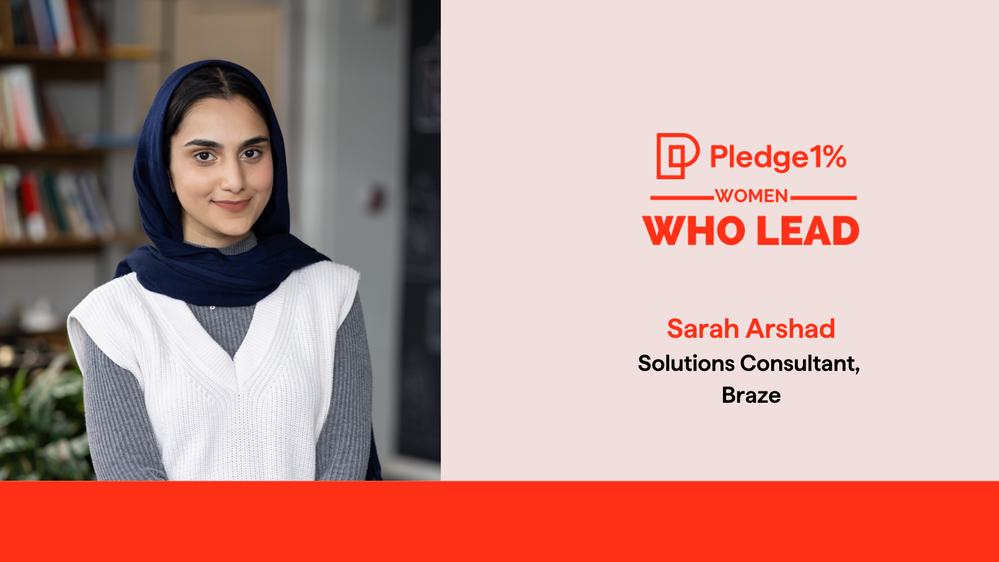
Sarah Arshad
Solutions Consultant, Braze
New Jersey, United States of America
Pledge 1% is celebrating its 10th Anniversary this year. What can companies do (or do more of) to have a positive social impact in the next 10 years?
To be fully transparent, we need to reframe how we think about social impact in corporate settings. Far too often, it gets treated as an afterthought; referenced as a side or passion project rather than a fundamental responsibility. As professionals, our work should ultimately leave the world in a better place. You cannot separate your work from its environmental impact, or reduce “diversity” to a checklist when both have real-world consequences.
Take the tech industry, for example. Biases can easily find their way into products and influence user experiences in ways we may not immediately recognize. Companies need to ask themselves: Are we driving meaningful change, or are we just keeping up appearances? How do we ensure that our work isn’t exacerbating these existing inequalities?
A responsible workplace should reflect the world it operates in by understanding the causes employees care for and creating meaningful ways for them to contribute. At Braze, I have been fortunate to lead fundraising efforts and cultural programming for causes I’m passionate about – primarily as a lead for the Muslims@Braze Employee Resource Group. The purpose of the Muslims@Braze ERG is to promote an environment that empowers Muslim employees, while educating allies and non-Muslim colleagues about our faith. From fundraising to provide food assistance for families during Ramadan to driving awareness about accessible education for the Deaf Muslim community, we’ve had several initiatives launched with the necessary support and enthusiasm from our Social Impact team to bring these ideas to fruition.
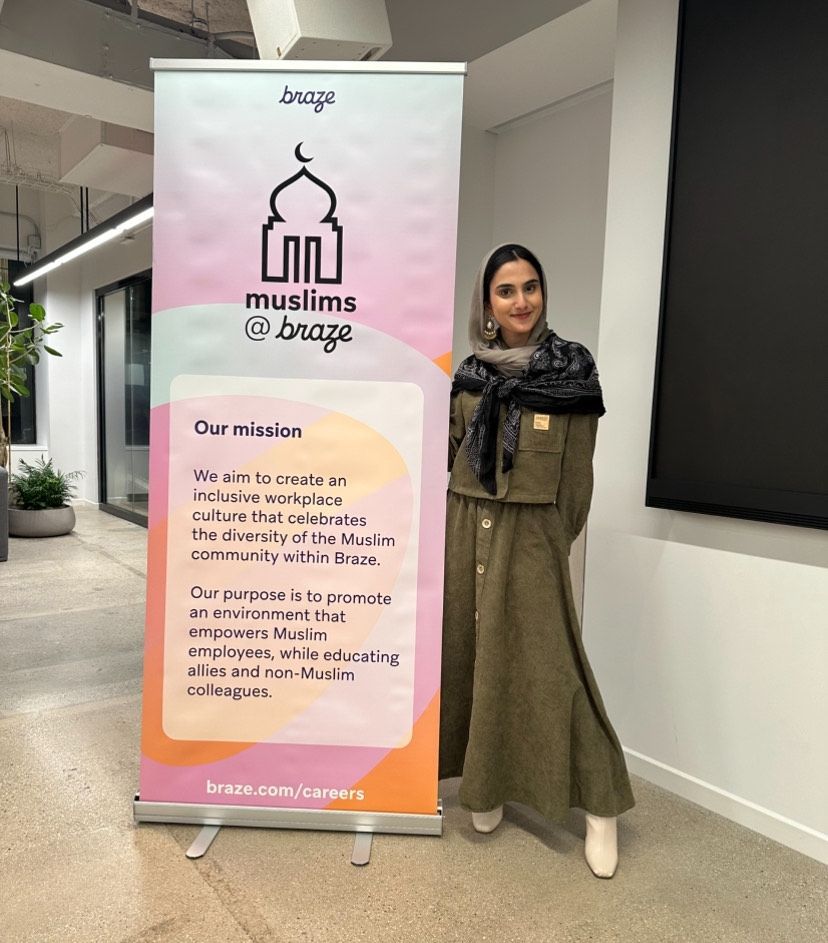
What’s the legacy you hope to leave for future generations?
I hope to be remembered as someone who lived without regrets and did the right thing, even when it wasn’t convenient. As a first-generation Pakistani Muslim-American, I know I represent something much larger than myself. I know that room for error is limited and there is heightened scrutiny on everything I do, but there is no appealing future in which I have to compromise on values or integrity.
For me, nothing matters more than staying true to my principles, and I hope to inspire others to do the same. Anything you lose as a result of doing what is fair and true to yourself orients you towards the opportunities and people that are ultimately the right fit.
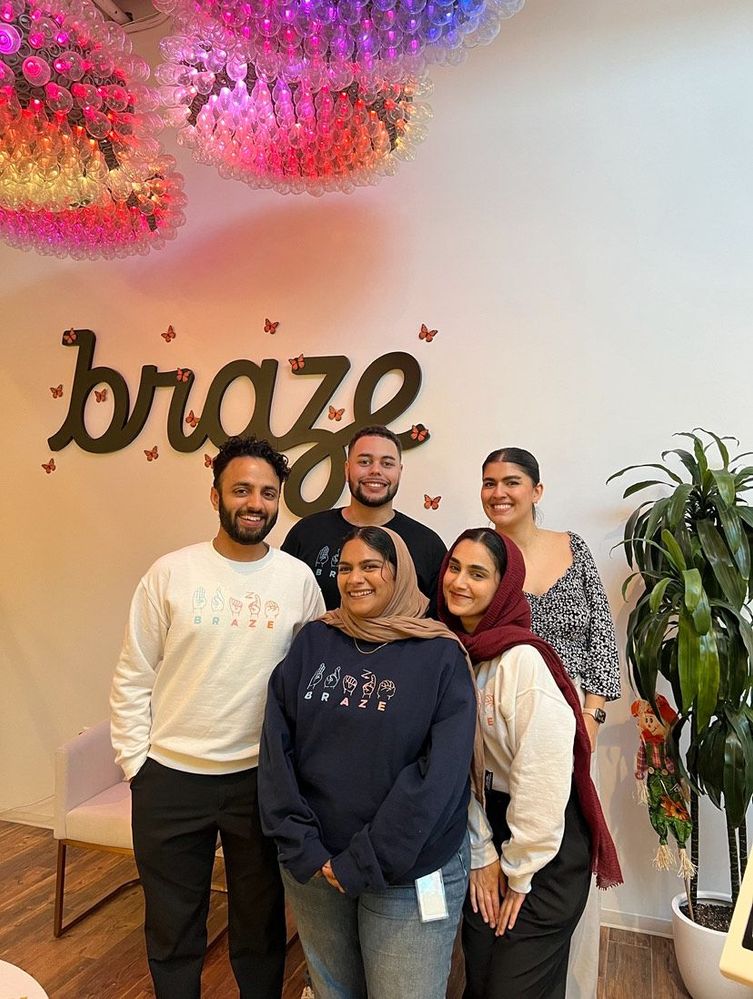
If you could choose one word to define your leadership style, what would it be and why?
Unwavering. When I have a goal in mind, I have to see the process through the end even if the chances of success are slim. Dedication can operate on the verge of obsession, but my hope is to always push myself (first and foremost) and others to leave no room for what-ifs. Pursue unconventional methods, and don’t take the easy way out when met with resistance.
When I have a goal in mind, I have to see the process through the end even if the chances of success are slim.
If you could give one piece of advice to the next generation of women leaders, what would it be?
Own your destiny personally and professionally. Remember that persistence and self-advocacy are just as crucial to success as talent and merit. If you can’t find an opportunity, create one. If the table you want to sit at doesn’t exist, build it yourself.
Looking ahead, what are you most excited about—whether in your professional journey or personal life?
I’m excited to never stop learning. I don’t aspire to have the “I made it” moment as much as I aspire to live a life that feels limitless and enriching. My love for storytelling through writing and travel are especially important to me, and I see myself weaving those into anything I decide to do personally or professionally in the future.
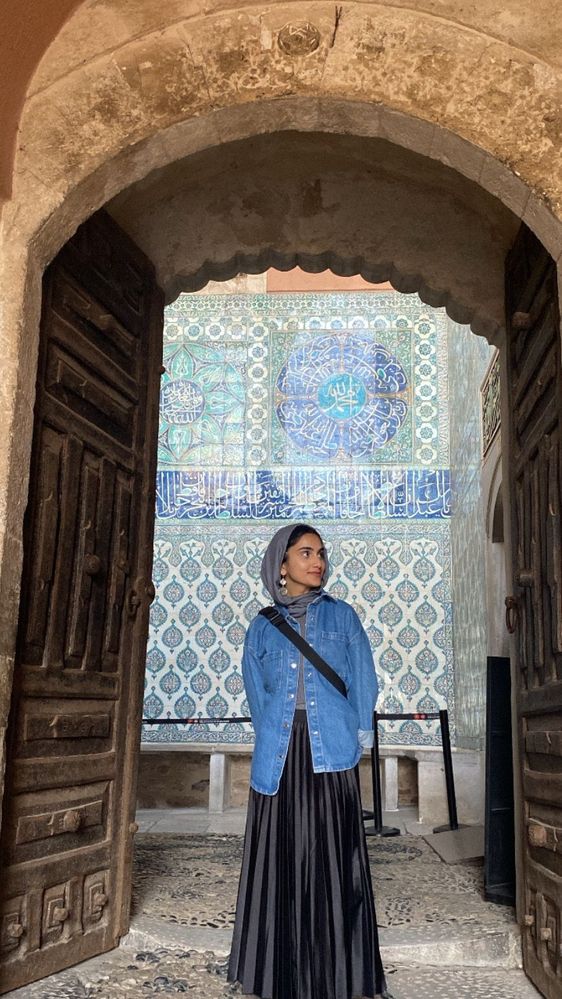
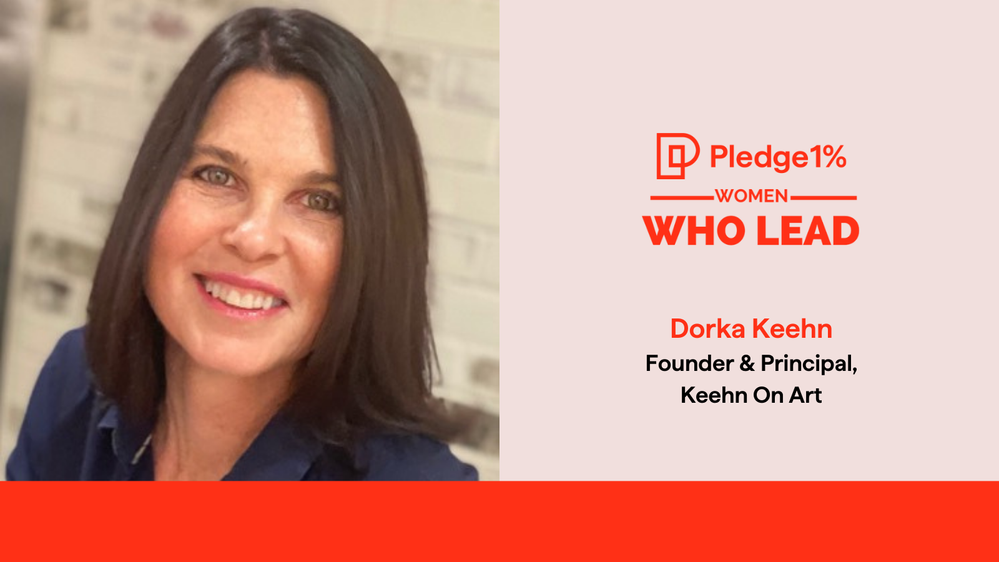
Dorka Keehn
Founder & Principal, Keehn On Art
SF, CA
Pledge 1% is celebrating its 10th Anniversary this year. What can companies do (or do more of) to have a positive social impact in the next 10 years?
Over the next decade, companies have a tremendous opportunity—and responsibility—to deepen their commitment to social impact. Beyond financial contributions, they can embed equity, sustainability, and community engagement into their core business strategies. This means creating inclusive workplaces, supporting diverse talent pipelines, investing in local economies, and ensuring that their products and services contribute to the greater good. Companies should also think beyond philanthropy and consider structural changes—such as ethical sourcing, responsible AI development, and regenerative business models—that align long-term success with positive social outcomes.
What’s the legacy you hope to leave for future generations?
I hope my legacy is one of empowerment—whether through my work in the arts, cultural policy, or political leadership. Co-founding Emerge America to train Democratic women to run for office and Ignite National to inspire young women’s civic engagement was about building long-term pathways for women to lead at every level of government. I want future generations to inherit a world where women’s leadership is not the exception but the norm, where the creative economy is fully valued, and where civic engagement is seen as essential to shaping a more just and vibrant society.
If you could choose one word to define your leadership style, what would it be and why?
Strategic. I believe in seeing the big picture while executing on the details. My leadership is about connecting dots—between people, policies, and possibilities—to create sustainable impact. Whether it’s developing a cultural strategy for a city, shaping arts policy, or mentoring emerging leaders, I focus on long-term solutions that create systemic change rather than one-off interventions.
If you could give one piece of advice to the next generation of women leaders, what would it be?
Own your power. Women often wait until they feel 100% ready before stepping up, but the truth is, no one has all the answers. Take risks, speak with confidence, and surround yourself with people who you can learn from and who share your vision. And don’t just aim to sit at the table—redesign the table to be more inclusive for those who come after you.
Take risks, speak with confidence, and surround yourself with people who you can learn from and who share your vision.
Looking ahead, what are you most excited about—whether in your professional journey or personal life?
Professionally, I’m excited about shaping San Francisco’s first comprehensive cultural strategy and ensuring that the creative economy is a cornerstone of the city’s recovery and future growth. Personally, I’m always energized by working with artists who are stepping into the public realm for the first time, helping them translate their vision into lasting works that shape our shared spaces. Seeing their impact—and knowing that art can transform communities and people—is what keeps me inspired.
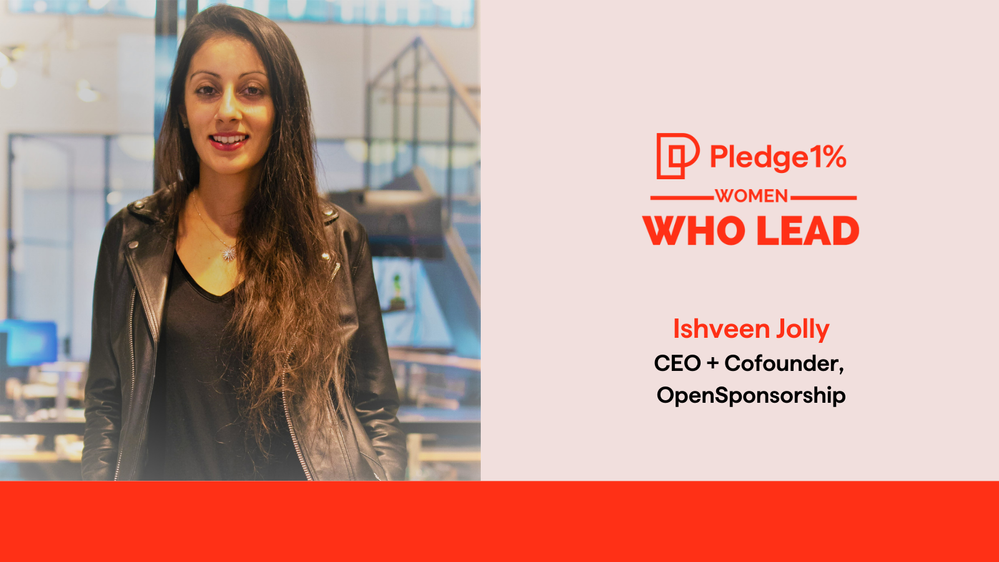
Ishveen Jolly
CEO + Cofounder, OpenSponsorship
London, UK
Pledge 1% is celebrating its 10th Anniversary this year. What can companies do (or do more of) to have a positive social impact in the next 10 years?
Right now, I feel it’s important for companies to provide stability and a safe working environment for team members, given how crazy the world is right now. That comes from transparency.
What’s the legacy you hope to leave for future generations?
To break down stereotypes and that hard work and a will to succeed can help you achieve anything.
If you could choose one word to define your leadership style, what would it be and why?
Honest
If you could give one piece of advice to the next generation of women leaders, what would it be?
Understand who you are, your core values, what you stand for, and ensure that you have that permeate across everything you do.
Looking ahead, what are you most excited about—whether in your professional journey or personal life?
We just reached profitability, so the world feels like a lot of good options for us. So now it’s about deciding what’s next.
Understand who you are, your core values, what you stand for, and ensure that you have that permeate across everything you do.
